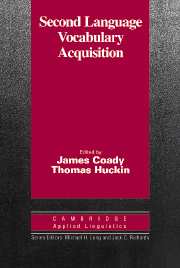Chapter 14 - L2 vocabulary acquisition: A synthesis of the research
Published online by Cambridge University Press: 05 October 2012
Summary
In Chapter 1 of this volume Zimmerman claims that “the teaching and learning of vocabulary have been undervalued in the field of second language acquisition (SLA) throughout its varying stages and up to the present day.” Richards (1976) was one of the first scholars to alert us to the fact that vocabulary is typically neglected in foreign or second language instruction. He attributes this lack to the “effects of trends in linguistic theory,” which at that time – the dusk of Structuralism and the dawn of the Chomskyan school of linguistics – was grammar- and soundoriented. Levenston (1979) also criticized applied linguistics for its general neglect of vocabulary acquisition in favor of syntactic development.
Another factor contributing to the neglect of vocabulary can be seen in the observation by Sinclair and Renouf (1988, p. 143) that “it is exceptionally difficult to teach an organized syllabus of both grammar and lexis at the same time.” In other words, it is very difficult to do two things at once. If one's syllabus is organized around grammar, then it will be unlikely that lexis can be focused on at the same time.
Moreover, Zimmerman reviews the history of language teaching methods in the first chapter of this volume and concludes that all of them pay some limited attention to vocabulary, but, with the possible exception of some newer approaches, e.g., Nattinger and DeCarrico (1992), and Lewis (Chapter 13, this volume), all emphasize other aspects of language learning far more than they do vocabulary.
- Type
- Chapter
- Information
- Second Language Vocabulary AcquisitionA Rationale for Pedagogy, pp. 273 - 290Publisher: Cambridge University PressPrint publication year: 1996
- 7
- Cited by



